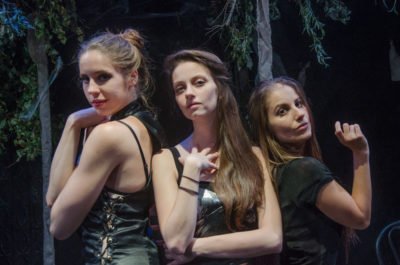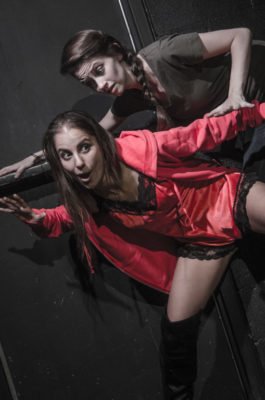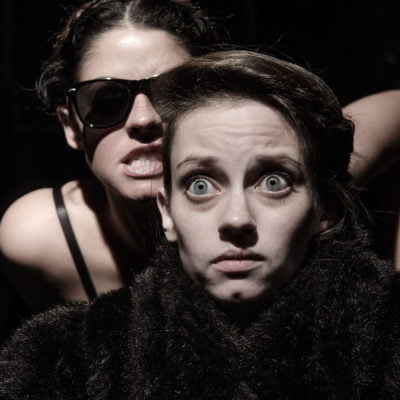The Fairytale Lives of Russian Girls
By Meg Miroshnik
Directed by Nicole Wiesner
Produced by Trap Door Theatre, Chicago
Fairytale Heroines Take on the Russian Free Market
Twenty-four years after the dissolution of the Soviet Union, the children of the emigrants are coming of age. This prompts Russian-Americans to ask the questions every immigrant group faces eventually: how much of the old country’s culture to pass on, and what is the old country’s culture at this point, anyway? Meg Miroshnik’s 2012 comedic drama, The Fairytale Lives of Russian Girls, is a wildly imaginative exploration of these topics, set mainly in a Moscow which, since the collapse of the Soviet police state, has seen a resurgence of monster and witch-related activity. At Trap Door, one of the Chicago theatres most immersed in the Eastern European communities, director Nicole Wiesner leads Russian Girls through an amusing, and often incisively satirical production.

Annie (Emily Nichelson) is a Russian-American whose mother, Olga (Ann Sonneville), wants her to return to Moscow to improve her linguistic skills. While not exactly opposed to the idea, as a Jew, Annie has a hard time romanticizing Russia, and is less than pleased with her mother’s idea to have her live with a woman called Aunt Yaroslava, who is not really an aunt, but somebody Olga is attempting to blackmail. Olga has lots of strange ideas; she claims Annie’s father was a powerful demonic sorcerer, Annie claims he ran off with a skank to Tennessee. They may both be right. However, it is the father’s opinion that it would be good for Annie to go anywhere that’s not with Olga, so off she goes. Upon arrival in Moscow, the customs official harangues Annie for using the wrong kind of visa, and for not knowing that her “Auntie” lives in a crumbling Khrushchev-era apartment building in the Land of the Truly Dead on the other side of the River of Fire. Auntie Yaroslava (Marzena Bukowska) turns out to be an old shut-in who obsesses over feeding Annie fattening pastries and assigning her ridiculous tasks, like cleaning poppy seeds. Who else could she be, but Baba Yaga?

Baba Yaga tells the audience through direct-address that she ages a year every time someone asks her a question, and that chatty girls constantly ask questions. But she’s not the only character from folklore to tell her story. During her stay, Annie meets and befriends three other young women whose lives are modern-updates of Russian fairytales, or skazki, collected by Alexander Afanasyev. The neighbor, Masha (Simina Contras), has maintained her interest in designer handbags and fashionable status symbols of all sorts, despite the disappointment of her poverty and discovering that her boyfriend awoke one day as a ravenous talking bear. Masha’s friend Katya (Halie Ecker) gave up her study of economics to become the mistress of a middle-aged oligarch, and is battling with his wife over the affections of his daughter. And Nastya (Meghan Lewis), the third friend, is a self-employed whore. Together, the four materialistic young women learn the power of friendship, which they will need to vanquish their enemies before they get discarded or eaten.
Miroshnek’s story is a rapidly spinning kaleidoscope of contemporary urban Russia. We go everywhere from Baba Yaga’s apartment, to the dancefloor in a hip bar, to the oligarch’s palace. Consequently, Aaron O’Neill’s set design is flexible and vague, except for a large brick oven. We rely more on Richard Norwood’s lighting and Danny Rockett’s original music to establish location, along with Nicole Wiesner’s directing, which uses up almost every inch of Trap Door’s theatre. She keeps the characters in constant motion, maintaining a restless atmosphere. But Miroshnek’s story isn’t just adrenaline or heavy ruminating on crass sexism and greed; it’s also very funny. Some of the humor is silly, like Baba Yaga’s still-bleating animal skin rug, but much of it is wry intellectual irony, or just dark and callous.

All five actresses have strong senses of comedy. As Annie, Emily Nichelson is a hilarious heroic child: cute and annoying, booksmart and streetdumb, friendly and self-absorbed. Watching her bond uncertainly with the tough, cynical Russian girls is heart-warming and anxiety-inducing at the same time. Masha, Katya, and Nastya’s ambitions aren’t exactly laudable—Katya’s is actually quite nasty—and their actresses don’t shy away from that. But the tone is such that we not only forgive them, but admire their brazenness. Ann Sonneville, too, gets many comedic moments as various characters, including a jaded professor of literature and the modish wife whose place Katya has usurped. But, of course, Marzena Bukowska as Baba Yaga has the key role. Fully committed to the cannibal witch’s viciousness and sardonicism, she’s the perfect embodiment of the villain everyone loves to hate. Rachel Sypniewski has supplied each character with costumes that demonstrate their style, or lack of it, but Baba Yaga’s discolored fangs are especially memorable.
From what I’ve seen, The Fairytale Lives of Russian Girls is being well-received among Chicago’s Russians. There are all sorts of points on which it resonates: that despite Annie’s Soviet identity papers having listed her nationality as “Jewish,” Baba Yaga smells the Russianness in her, the materialism and fashion-consciousness of the urban youth, the tumultuous gender roles and contradictory attitude toward sex. But the show is also a celebration of storytelling, which makes it accessible to everyone, and Russian words and concepts are explained serviceably in ways that flow naturally with the narrative. Each fairytale is dramatic in its own right, and the updated, intertwining versions reinforce each other. As smart as Miroshnik’s script is, her commentary doesn’t come at the expense of theatricality. In true Russian style, Russian Girls is both darkly satirical and an amusing adventure.
Highly Recommended
Jacob Davis
[email protected]
Reviewed October 22, 2015
This show has been Jeff recommended.
For more information, see The Fairytale Lives of Russian Girls’ page on Theatre in Chicago.
Playing at Trap Door Theatre, 1655 W Cortland Ave, Chicago. Tickets are $20-25 with 2 for 1 admission on Fridays; to order, call 773-384-0494 or visit trapdoortheatre.com. Plays Thursdays, Fridays, and Saturdays at 8:00 pm through November 21. Running time is ninety-five minutes.
